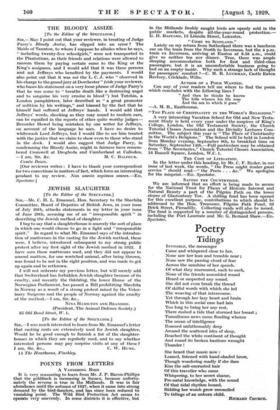THE BLOODY ASSIZE
[To the Editor of the SPECTATOR.] SIR,—May I point out that your reviewer, in treating of Judge Parry's Bloody Assize, has slipped into an error ? The Maids of Taunton, to whom I suppose he alludes when he says, " including twenty-five schoolgirls," were not transported to the Plantations, as their friends and relations were allowed to ransom them by paying certain sums to the King or the King's assignees, and I would add that it was these persons and not Jeffreys who benefited by the payments. I would also point out that it was not the L. C. J. who " observed in his charge to the grand jury at Dorchester" (vide your reviewer, who bases his statement on a very loose phrase of Judge Parry's that he was come to " breathe death like a destroying angel and to sanguine his very ermine in blood ") but Tutchin, a London pamphleteer, later described as " a great promoter of sedition by his writings," and biassed by the fact that he himself had suffered at Jeffreys' hands. I would add that Jeffreys' words, shocking as they may sound to modern ears, can be equalled in the reports of other quite worthy judges— Recorder Howel being mistaken by one writer for Jeffreys, on account of the language he uses. I have no desire to whitewash Lord Jeffreys, but I would like to see him treated with the justice that we claim to show even to those who stand in the dock. I would also suggest that Judge Parry, in condemning the Bloody Assize, might in fairness have remem- bered Cromwell at Drogheda and Cumberland at Culloden.
[Our reviewer writes : I have to thank your correspondent for two corrections in matters of fact, which form an interesting pendant to my review. Non omnia sapimus omnes.—En. Spectator.]


































 Previous page
Previous page